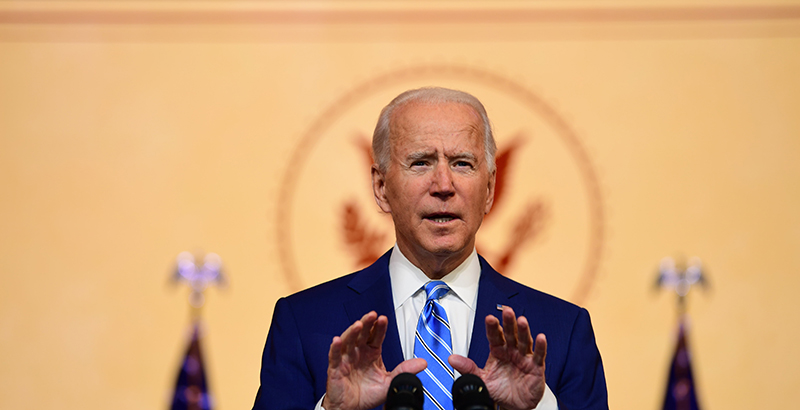Biden Administration Requires States to Test Students, But With Flexibility for Shorter, Remote or Delayed Exams. Experts Say Balance Struck is ‘Sensible’

In the Biden administration’s first high-stakes decision for the nation’s schools, the education department announced Monday evening that states will be required to administer federally mandated standardized tests this spring.
However, amid the difficult circumstances of the pandemic, schools will not be punished for low scores and states will have the option to give shorter, remote or delayed versions of the yearly exams.
The decision, issued before Biden’s education secretary nominee Miguel Cardona’s expected confirmation, was met with celebration by many education advocacy organizations and frustration by teachers unions. For the new administration it represents an effort to take stock of the learning that has been lost amid coronavirus school closures.
“To be successful once schools have re-opened, we need to understand the impact COVID-19 has had on learning and identify what resources and supports students need,” Ian Rosenblum, acting assistant education secretary, wrote in a letter to state education leaders.
Federal law under the Every Student Succeeds Act requires states to hold schools accountable for student achievement through spring assessments. Last March, however, when school leaders were busy responding to the onset of a pandemic that shuttered schools across the country, then-Secretary Betsy DeVos forgoed the testing requirement, approving waiver requests from all 50 states.
This year, before the White House finalized a decision, at least eight states — South Carolina, Oregon, Illinois, Michigan, New Mexico, New Jersey, Montana and New York — requested waivers. Others, such as Tennessee, Florida and Texas, indicated that they intended to assess students even if Washington allowed them not to.
The Biden administration’s announcement, while clarifying that the spring tests will proceed, also includes accommodations to adapt for the pandemic. The education department’s letter says states can request to give less lengthy exams, test remotely, or extend the window for assessment — potentially into the summer. States may also request to forgo the 95 percent participation requirement and accountability measures that use test results to identify schools as low performing and needing improvement.
The additional flexibility offered did not satisfy union leaders, who widely supported cancelling assessments.
“[I]t is a frustrating turn to see the administration ask states to continue requiring assessments during this tumultuous school year,” AFT President Randi Weingarten said in a press release.
“Standardized tests have never been valid or reliable measures of what students know and are able to do, and they are especially unreliable now,” added NEA President Becky Pringle, who urged state leaders to request waivers for accountability requirements.
“High stakes standardized tests administered during the global health crisis should not determine a student’s future, evaluate educators, or punish schools,” she said.
While the Council of Chief State School Officers said it appreciated the administration’s willingness to bend on several fronts, some state leaders expressed disappointment and uncertainty.
“While we appreciate the potential flexibility around accountability and school identification, we are extremely disappointed by the approach to testing,” Meghan Frick, spokesperson for the Georgia Department of Education, told The 74.
Katy Payne, communications director for Washington schools, said her department has yet to determine how it will handle spring tests. South Carolina, which submitted a request to waive their usual tests before Monday’s announcement, still hopes that their plan might be approved.
“We do not view the letter sent yesterday by the U.S. Department of Education as impacting South Carolina’s assessment waiver request,” Ryan Brown, a spokesperson for the state’s education department, wrote to The 74 in an email. “We are not requesting a blanket waiver but rather asking to substitute a series of interim assessments administered to all students for the typical summative end of year tests.”
Other states’ waiver requests also proposed alternative methods for taking stock of the pandemic’s impacts. For example, Oregon promised to “center student voice[s]” in its accountability efforts, said press representative Marc Siegel, by leaning on a statewide survey meant to identify the areas that youth may need support.
Until the White House responds to individual requests, states will have to be prepared for either outcome. In South Carolina, Brown is confident.
“If our waiver end[s] up being accepted, we will be ready. If it ends up being denied, we will be ready,” he said.
Accounting for marginalized students
The decision to go forward with standardized tests this spring plays into a larger dialogue, going back far beyond the pandemic, on the effectiveness and equity implications of high-stakes exams. While some argue that assessments are born from racist beginnings and remain racially biased, another side contends that test data are necessary to equitably distribute resources and ensure that students don’t fall behind.
Some state waiver requests, submitted before Monday’s announcement, appealed to the former concern.
“Testing will further exacerbate the inequities that existed pre-COVID” due to the disproportionate burden that the pandemic has placed on marginalized students, Illinois’s appeal argued. “Testing students in the midst of a health, economic, and social crisis is not compassionate or trauma-informed.”
In survey results from the fall, a majority of parents felt similarly. A nationally representative sample of over 1,300 parents found that 64 percent favored nixing spring assessments.
A number of education advocacy organizations, however, took the opposite stance.
Marc H. Morial, president and CEO of the National Urban League, which signed a January letter urging the Biden administration to refrain from canceling spring exams, emphasized the importance of assessments at this moment.
“The data is needed to help inform the deployment of resources and interventions to students that have fallen behind,” he told The 74 over email.
Meghan Whittaker, director of policy and advocacy at the National Center for Learning Disabilities, which signed the same joint letter, agreed.
“If we abandon [statewide assessments], we have no evidence to show just how far behind students with disabilities have fallen during the pandemic,” she told The 74 over email. “We are glad to see that [the education department] is not issuing a blanket waiver.
The option to forgo the usual 95 percent participation requirements for tests, however, worries Whittaker. For years, students with disabilities were actively excluded from taking statewide assessments, which allowed low performance to be masked and disparities to go unaddressed.
“We will be watching closely to see which students are tested and which aren’t,” she said.
But despite hopes of robust test participation, some state officials have admitted that they have little ability to force students to show up for exams during a pandemic, and remote assessments pose problems of their own. Aside from the validity of student responses, many states worry whether students’ home Wi-Fi would be able to support online tests. The waiver letter that Oregon officials submitted to the White House before Monday’s announcement pointed out that 20 to 39 percent of the state’s youth do not have sufficient internet access to take exams remotely.
A preview of what testing during a pandemic might look like can be found In Ohio, where only 81 percent of students sat for exams administered last fall — well below the 95 percent mark. Testing was carried out in person, and participation was lowest among students in districts that were fully remote, as well as among low-income students and students of color.
The “full picture” on learning loss
Given the constraints of the pandemic, Thomas Dee, a professor of education at Stanford University who researches test-based accountability, thinks the Biden administration did a good job threading the needle by requiring high-quality data without high-stakes accountability.
“The resulting data on student learning will complement our nascent understanding of the pandemic’s effects. And the U.S. Department of Education is making this requirement more practical and safe by providing flexibility along several dimensions,” Dee told The 74. “The balance struck here seems sensible.”
The Stanford professor affirms the need for better measures quantifying the pandemic’s toll on kids.
“Data are just beginning to emerge about what the pandemic has meant for child development,” he said. “And I don’t think we have anything like the full picture yet.”
One early indicator arrived in November when the nonprofit assessment group NWEA released scores showing that learning loss had not been as severe as some experts had worried. But the results came with an enormous caveat: many of the most disadvantaged students were missing from the data due to absences on exam day — leaving understanding of what’s come to be known as COVID slide cloudy and incomplete.
But as helpful as test scores will be for quantifying what students have missed, Dee believes other measures will also be vital.
“We have leading data that, during the pandemic, some of our most educationally vulnerable students face challenges more fundamental than ‘learning loss,’” he said. “Diverse forms of data will allow [us] to design appropriately targeted solutions.”
Specifically, Dee hopes enrollment and absenteeism data will help guide efforts to identify and support students who may be falling through the cracks amid school closures.
Whittaker, too, of the learning disabilities center, urges states to examine “opportunity to learn” indicators. In addition to attendance, she raised access to technology as a key factor.
“Statewide assessments are important,” she said, “[but] there is more needed to support students right now.”
Staff writer Linda Jacobson contributed to this report
Get stories like these delivered straight to your inbox. Sign up for The 74 Newsletter

;)
